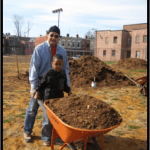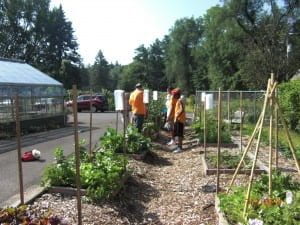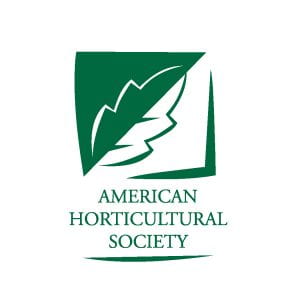Benefits of Garden-Based Learning
Research That Supports Our Work
Benefits of Garden-Based Learning
Gardening  enhances the quality of life in numerous ways: providing fresh food, exercise and health benefits, opportunities for multi-generational and life-long learning, creating pleasing landscapes and improved environment, and bringing people together.
enhances the quality of life in numerous ways: providing fresh food, exercise and health benefits, opportunities for multi-generational and life-long learning, creating pleasing landscapes and improved environment, and bringing people together.
Garden-based learning programs result in increased nutrition along with environmental awareness, higher learning achievements, and increased life skills for our students. They are also an effective and engaging way to integrate curricula and meet learning standards, giving young people the chance to develop a wide range of academic and social skills.
Garden experiences foster ecological literacy and stewardship skills, enhancing an awareness of the link between plants in the landscape and our clothing, food, shelter, and well-being. They also provide children and youth with the time and space to explore the natural world–something that can occur rarely in today’s era of indoor living.
Why Garden With Children?
Before beginning any new project, you often have to convince administrators that it will be a worthwhile effort. Depending on your approach, you may be able to satisfy a number of educational, community, and developmental needs. Here are some of the benefits:
- Generate pride among community members
- Instill a sense of ownership, pride, and responsibility among students
- Enhance the appearance, image, and popularity of a school or organization
- Improve the behavior and attitude of young people
- Provide a wholesome activity that keeps all kids engaged
- Connect children to the source of their food
- Heighten children’s environmental awareness and promote earth stewardship
- Improve the quality of the curriculum, providing for more effective teaching
- Make valuable connections between disciplines or subject matter areas such as science, math, and social studies
- Foster science literacy
“Children’s gardens provide boundless opportunities to connect with nature, hands-on learning, and they facilitate a sense of wonder and curiosity.”-–Mark Miller, Education Manager at Franklin Park Conservatory and Botanical Gardens in Columbus, Ohio
Gardening in Schools
 You may be looking for ways to share the excitement of school gardening with other teachers, or you might need to convince your administrators of the benefits of beginning a gardening program in your school. Although you are familiar with all the merits, you will need research-based justification as to why gardening is so important. Use this PowerPoint presentation Why Garden in New York State Schools? to get everyone on board. Designed as a guided presentation, or a stand alone that can run on its own, this will help you rally others and build enthusiasm for your gardening program. Learn ways to incorporate gardening into school curriculum with this helpful pdf, Integrating a Garden into the School Curriculum. Visit the Sustaining The Garden page for more information on effectively using the garden.
You may be looking for ways to share the excitement of school gardening with other teachers, or you might need to convince your administrators of the benefits of beginning a gardening program in your school. Although you are familiar with all the merits, you will need research-based justification as to why gardening is so important. Use this PowerPoint presentation Why Garden in New York State Schools? to get everyone on board. Designed as a guided presentation, or a stand alone that can run on its own, this will help you rally others and build enthusiasm for your gardening program. Learn ways to incorporate gardening into school curriculum with this helpful pdf, Integrating a Garden into the School Curriculum. Visit the Sustaining The Garden page for more information on effectively using the garden.
Learn about the Academic Benefits of Garden-Based Curriculum with these helpful resources: Physical and Biological Sciences and Sustainability and Ecology (pdfs).
Community Gardening
 Interest is expanding around supporting community gardening as numerous opportunities and benefits are being realized. Two organizations who have compiled much data on the benefits of community gardening include Gardening Matters and the American Community Gardening Association. In addition, Farming Concrete offers a data collection and evaluation toolkit. For even more information, check out University of Missouri Extension’s Community Gardening Toolkit.
Interest is expanding around supporting community gardening as numerous opportunities and benefits are being realized. Two organizations who have compiled much data on the benefits of community gardening include Gardening Matters and the American Community Gardening Association. In addition, Farming Concrete offers a data collection and evaluation toolkit. For even more information, check out University of Missouri Extension’s Community Gardening Toolkit.
So You Want to Start a Garden: Taking the First Step
Getting Started with Garden-Based Learning: An Introductory Guide for Program Leaders/Educators offers the basics to consider if you are starting a new program or wishing to enhance outcomes in an existing program.
Homegrown: Community Gardening on Military Installations (pdf of a tri-fold)
Why Garden With Military Families?
- Helps individuals and families connect with others
- Can engage the whole family
- Strengthens youth and adult relationships
- Reduces stress
- Improves wellness through physical activity and consumption of fruits and vegetables
- Leads to reductions in family food expenses
Why Garden with Military Family Members? presentation to help rally others and build enthusiasm for a gardening program with military family members. Designed as a guided presentation, or a stand alone.
Why Garden with Military Family Members? mini poster is also available to download, print, distribute and display.
Research That Supports Our Work
One of the realities of working within the world of garden-based learning is that, inevitably, you may need to write a proposal to support a program or help you initiate a new project. Fortunately, there is research that you can draw from to advocate for your efforts. The following is a summary of research findings that you can cite in proposals, share with your board of directors, and use in countless other ways to support the important work that you are carrying out. Additionally, you’ll find links with more helpful information. Know of a great article that’s missing? Please send it along to us!
Key Research Findings: Highlights from journal articles, fact sheets, curricula, research studies and more. Highlights includes several key benefit areas of garden-based learning including Nutrition and Environmental Awareness, Learning Achievements, Life Skills, Health, Wellness and Community Building. Research Supporting Garden-Based Learning organized on Zotero.
Collective School Garden Network Research Database: By encouraging and supporting a garden in every school, the Collective School Garden Network creates opportunities for our children to discover fresh food, make healthier food choices, and become better nourished. Visit their research database for a variety of articles.
Role of Plants and Landscape in Human Health: Useful resources to pursue a better understanding of the role of plants and landscapes in human health and well-being.
NatureRx (pdf) – A helpful list of articles Related to the Restorative Effects of Time in Nature Prepared by Dr. Don Rakow 6/2015. Visit here for the webpage version.



